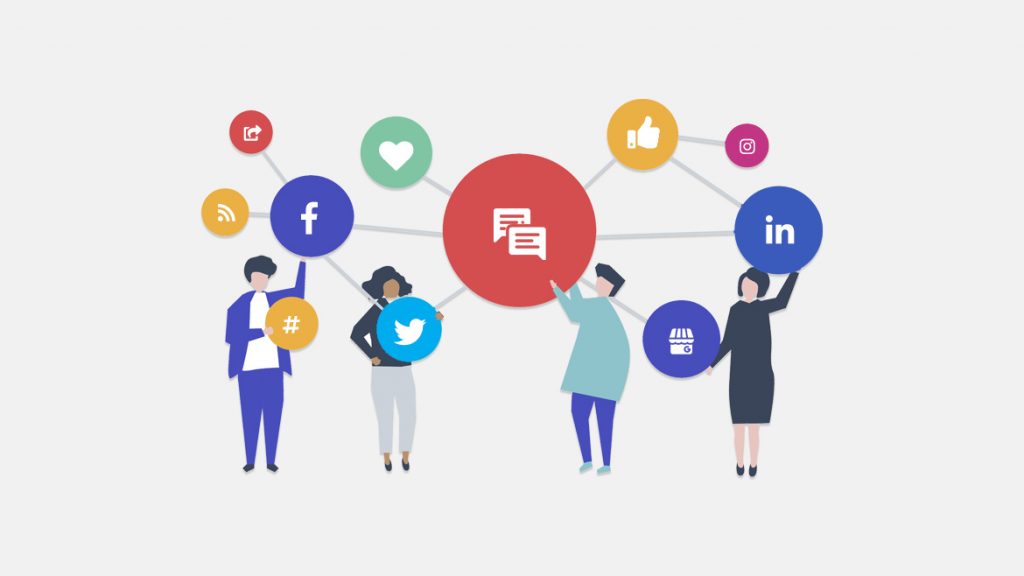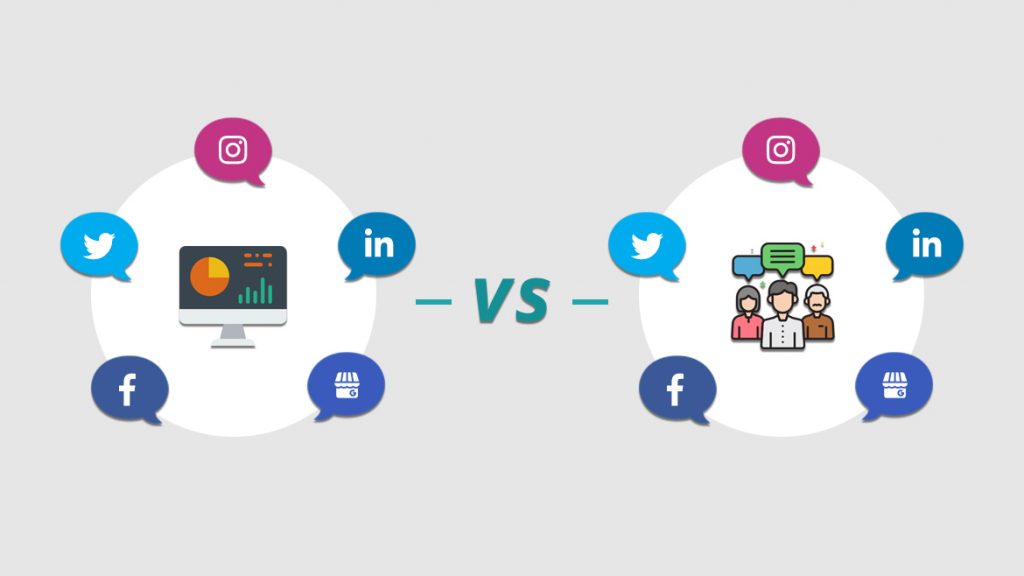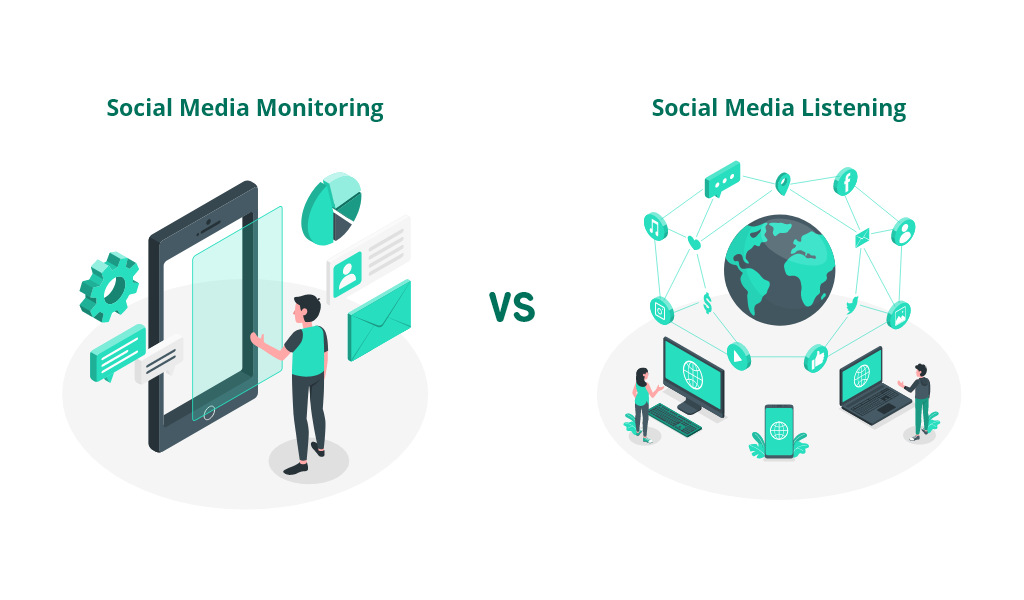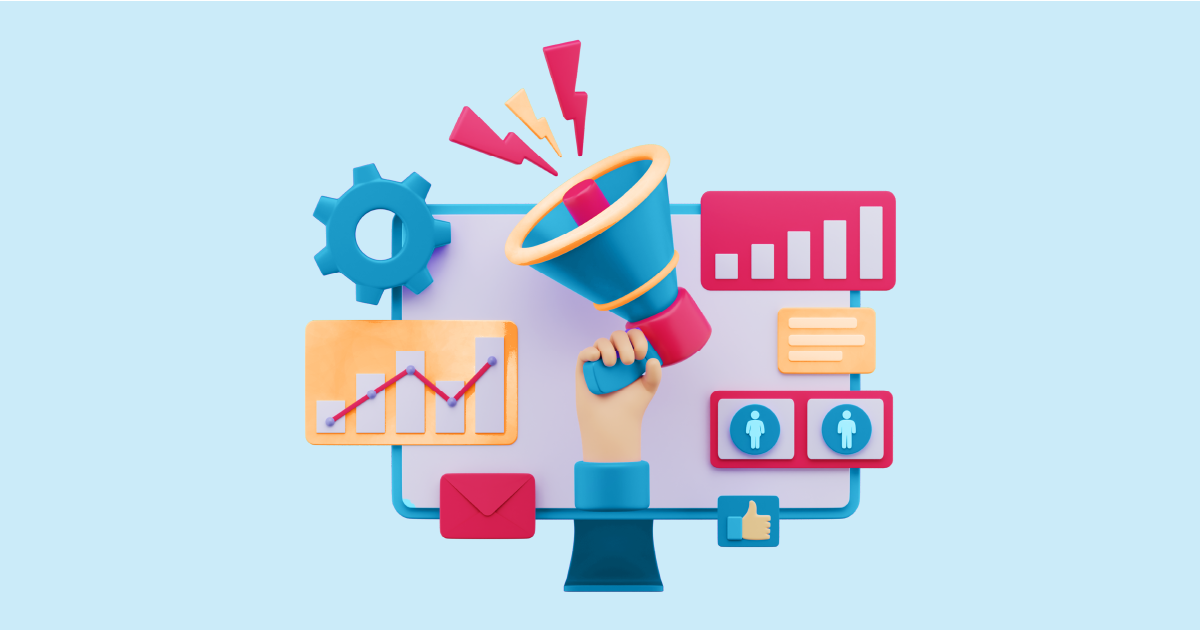In today’s digital age, social media plays a crucial role in shaping brand reputation, customer perception, and overall business success. To effectively navigate the social landscape, businesses need to leverage powerful strategies such as social listening and social monitoring. These two approaches enable companies to gain valuable insights, but they differ in their objectives and methodologies. In this article, we will explore the key differences between social listening vs. social monitoring and highlight their respective benefits for businesses.
Social Listening Vs. Social Monitoring: The Ultimate Guide
What is Social Listening?

Social listening refers to the practice of actively monitoring and analyzing online conversations and discussions related to a brand, industry, or specific keywords. It involves tracking mentions, comments, and feedback across various social media platforms, blogs, forums, and review websites. The primary goal of social listening is to understand customer sentiments, uncover trends, and identify opportunities for engagement and improvement.
The Significance of Social Listening
Social listening enables businesses to gain a deep understanding of their target audience by capturing real-time conversations. It provides insights into customers’ perceptions, preferences, and pain points, helping organizations tailor their marketing strategies and improve their products or services. By actively listening to what customers are saying, businesses can enhance their brand reputation, build stronger relationships, and drive customer loyalty.
How Does Social Media Listening Work?
Social listening involves using specialized tools and technologies to monitor online conversations across multiple platforms. These tools track keywords, hashtags, and mentions, allowing businesses to analyze the sentiment, volume, and context of discussions. By utilizing advanced analytics, sentiment analysis, and data visualization techniques, companies can extract meaningful insights from vast amounts of social data.
Key Benefits of Social Listening
- Understanding Customer Sentiments: Social listening helps businesses gauge customer emotions, opinions, and attitudes towards their brand or industry. This information can be used to develop more targeted marketing campaigns and personalized experiences.
- Identifying Industry Trends: By monitoring social conversations, businesses can stay updated on the latest trends, emerging topics, and industry influencers. This knowledge allows companies to adapt their strategies and stay ahead of the competition.
- Enhancing Customer Service: Social listening enables companies to address customer queries, concerns, and complaints promptly. By responding in a timely and empathetic manner, businesses can foster positive customer experiences and resolve issues before they escalate.
What is Social Monitoring?

Social monitoring involves tracking and collecting data on brand mentions, engagements, and other relevant metrics across social media platforms. Unlike social listening, which focuses on customer sentiments and broader industry insights, social monitoring primarily revolves around monitoring brand-specific metrics and performance indicators.
The Importance of Social Monitoring
Social monitoring is crucial for businesses as it provides valuable insights into their brand’s performance and online presence. It allows companies to assess their social media marketing strategies, measure the impact of their campaigns, and monitor brand reputation. By tracking metrics such as reach, engagement, and sentiment, organizations can gauge the effectiveness of their social media efforts.
How Does Social Monitoring Work?
Social monitoring involves using monitoring tools and analytics platforms to track key performance indicators (KPIs) and metrics related to a brand’s social media presence. These tools provide real-time data on reach, impressions, likes, shares, comments, and other engagement metrics. By analyzing this data, businesses can evaluate the success of their social media strategies and make data-driven decisions.
Key Benefits of Social Media Monitoring
- Tracking Brand Reputation: Social monitoring helps businesses monitor brand mentions, reviews, and customer feedback in real time. By promptly addressing negative comments or issues, organizations can protect their brand reputation and maintain a positive online presence.
- Measuring Campaign Effectiveness: By monitoring social media metrics, companies can assess the impact of their marketing campaigns and initiatives. This enables them to optimize their strategies, identify areas for improvement, and allocate resources effectively.
- Competitor Analysis: Social monitoring allows businesses to keep a close eye on their competitor’s social media activities, campaigns, and customer interactions. This knowledge provides insights into industry trends, competitor strategies, and potential collaboration opportunities.
Social Listening Vs. Social Monitoring: A Comparison

While social listening vs. social monitoring share similarities in terms of tracking online conversations, they differ in their primary objectives and scope. Social listening focuses on understanding customer sentiments, identifying trends, and gathering industry insights, whereas social monitoring centers around tracking brand-specific metrics and monitoring performance indicators.
Which Approach Should You Choose?
The choice between social listening and social monitoring depends on the specific goals and priorities of a business. If the aim is to gain a comprehensive understanding of customer sentiments and industry trends, social listening is the preferred approach. On the other hand, if the focus is on tracking brand performance, monitoring campaigns, and measuring metrics, social monitoring should be prioritized.
Leveraging Social Listening and Social Monitoring Together
To maximize the benefits and insights derived from social media, businesses can leverage both social listening vs. social monitoring in a complementary manner. By combining these approaches, organizations can gain a holistic understanding of their audience, industry landscape, and brand performance. This integrated approach enables businesses to make data-driven decisions, improve customer experiences, and drive overall business growth.
Case Studies: Record-Breaking Success Stories
1. Nike’s Social Listening Drives Product Innovation
Nike has long been a leader in leveraging social listening to understand customer needs and innovate accordingly. One of the best examples is the launch of the Nike FlyEase, a hands-free sneaker designed for people with disabilities.
🔍 How Social Listening Helped:
- Nike’s team identified a growing conversation on social media about the challenges people with disabilities face when putting on shoes.
- They engaged with customers directly, gathering insights from online discussions.
- This led to the development of Nike FlyEase, a product that became a game-changer for inclusivity in footwear.
📈 Results:
- The FlyEase campaign received over 1.5 million social media engagements within the first week.
- Sales exceeded expectations, and the product became a symbol of innovation and accessibility in the sneaker industry.
🗣 Influencer Insight:
“Great brands listen before they speak. Nike’s FlyEase is proof that social listening can drive real change in product development.” — Gary Vaynerchuk (@garyvee)
2. Wendy’s Viral Twitter Strategy – Social Monitoring at Its Best
Wendy’s is famous for its witty, bold, and often savage Twitter presence. Their social monitoring strategy allows them to respond instantly to customers, competitors, and trends, making them a top-performing brand on social media.
🔍 How Social Monitoring Helped:
- Wendy’s tracks brand mentions and customer interactions in real-time.
- Their social team actively responds to tweets, roasting competitors and engaging customers with humor.
- One famous interaction with a fan asking how many retweets were needed for free nuggets (18M retweets!) made history.
📈 Results:
- The campaign generated 3.5 billion impressions across social platforms.
- Wendy’s Twitter following skyrocketed, leading to record-breaking sales in 2017.
🗣 Influencer Insight:
“Wendy’s didn’t just monitor; they engaged. Social media isn’t a megaphone—it’s a two-way conversation.” — Neil Patel (@neilpatel)
3. Netflix’s Binge-Worthy Social Listening Approach
Netflix uses social listening to track trends, audience sentiments, and meme culture to shape its content and marketing strategies.
🔍 How Social Listening Helped:
- Netflix detected an increase in nostalgic conversations about the ’80s and capitalized on this insight by heavily promoting Stranger Things.
- They engaged in viral moments, like the #StrangerThingsChallenge, where users shared their favorite scenes.
📈 Results:
- Stranger Things became one of the most-watched series in Netflix history.
- The campaign saw over 15 million tweets in the first month.
🗣 Influencer Insight:
“Netflix turns conversations into content gold. They listen, adapt, and create binge-worthy marketing.” — Rand Fishkin (@randfish)
Conclusion
In conclusion, social listening vs. social monitoring are two powerful strategies that enable businesses to harness the vast potential of social media. While social listening helps in understanding customer sentiments and industry trends, social monitoring focuses on tracking brand-specific metrics and measuring campaign effectiveness. By leveraging these approaches together, businesses can gain valuable insights, enhance their brand reputation, and stay ahead in today’s competitive digital landscape.
Are you ready to unlock the full potential of social media for your business? Request a demo from AIM Technologies today and see how our advanced social listening and monitoring tools can revolutionize your marketing efforts. Take the first step towards understanding your audience, improving customer experiences, and driving business growth.
FAQs
Q1: Can social listening and social monitoring be used for any industry?
- Yes, social listening and social monitoring can be applied to any industry. The techniques and tools used may vary depending on the specific industry and target audience.
Q2: Are social listening and social monitoring only applicable to large businesses?
- No, both social listening and social monitoring can benefit businesses of all sizes. The insights gained from these practices can help companies refine their strategies, improve customer satisfaction, and drive growth.
Q3: How often should social listening and social monitoring be performed?
- The frequency of social listening and social monitoring depends on various factors such as industry dynamics, the size of the business, and marketing objectives. Ideally, these practices should be performed regularly to stay updated and respond promptly to customer feedback.
Q4: Can social listening and social monitoring help in crisis management?
- Yes, social listening and social monitoring are invaluable tools in crisis management. By monitoring online conversations and sentiments during a crisis, businesses can take immediate action, address concerns, and mitigate reputational damage.
Q5: Is it possible to automate social listening and social monitoring?
- Yes, there are various tools and software available that can automate social listening and social monitoring processes. These tools help in efficiently tracking and analyzing vast amounts of data, saving time and resources for businesses.




